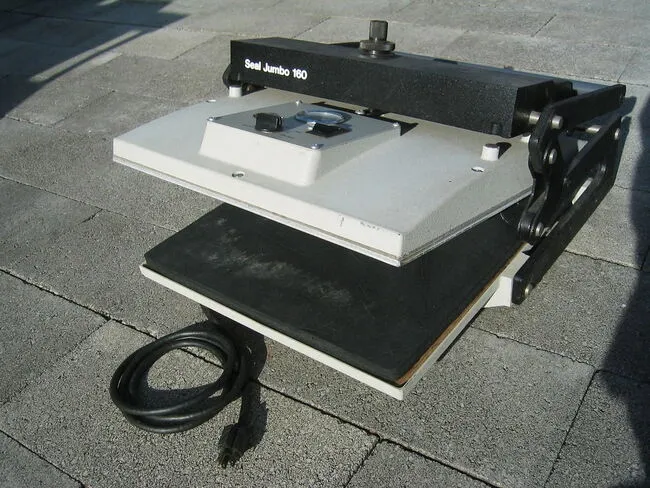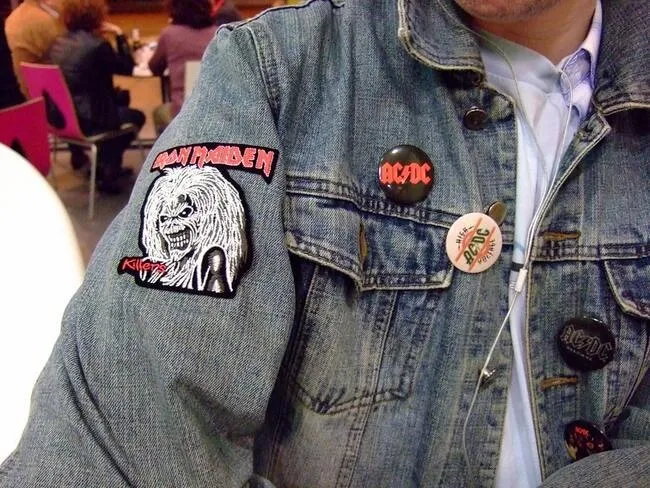Can You Use A Heat Press For Iron-On Patches? Temperature Tips & Benefits
Discover the advantages of using a heat press for iron-on patches in our post where we explore the potential of choosing this method over traditional ironing. Read on to discover the effectiveness of using a heat press with iron-on patches, including essential temperature tips to achieve a successful application. This is a comprehensive guide that will enable you to determine the optimal method for your next project.

Key Takeaways
- Using a heat press on iron-on patches ensures consistent temperature and pressure, crucial for achieving a strong, long-lasting adhesion.
- Generally speaking, a temperature of around 350┬░F is best for embroidered patches, while around 300┬░F is better for vinyl. Adjust based on the patch type and fabric.
- Preheat both the garment and patch, and use a protective sheet, for best results. A heat press should apply firm, even pressure for 10-15 seconds to activate the adhesive.
- Irons are more accessible to most, but they cannot achieve such precise control over temperature and pressure. This is why a heat press is better for professional projects.
- We supply high-quality custom iron-on patches that are suitable for heat presses to achieve a strong adhesion and get a striking, professional aesthetic.
Table of contents
-
Can You Use A Heat Press For Iron-On Patches?
-
What Temperature To Press Iron-On Patch Correctly?
-
How To Apply Iron-On Patches With A Heat Press
-
Differences Between Heat Press And Traditional Iron For Patches
-
How To Care For Garments With Iron-On Patches Through Heat Press
-
What Are Specific Use Cases Of Heat Press For Patches?
-
Can You Use A Heat Press For Sublimation Patches?
Can You Use A Heat Press For Iron-On Patches?
You can use a heat press for iron-on patches. In fact, this is the top method for how to iron on patches without an iron, and may yield better results than traditional ironing. With a heat press, you can easily achieve even pressure and temperature consistency - two crucial considerations for a strong, long-lasting bond. With this approach, you reduce the risk of patch edges peeling over time.
The benefits of using a heat press include:
- Precision
- Efficiency
When you use an iron, you may get heat spots or uneven pressure, but a heat press is designed to deliver uniform heat distribution. This makes it ideal for certain jobs, like applying multiple patches quickly and consistently. The adjustable temperature and pressure settings allow you to tailor your approach to the patch material and garment type.
Beginners should set the heat press to the recommended temperature for the patches. Preheat the garment and always use a protective sheet. The manufacturer’s instructions should provide all the guidance you need.

What Temperature To Press Iron-On Patch Correctly?
The optimal temperature to heat press iron-on patches depends on the type of patch and fabric. Generally, embroidered patches require a temperature of around 350°F, while vinyl patches need around 300°F. Delicate fabrics will need a lower temperature to prevent scorching.
To achieve proper adhesion, test the temperature on a small scrap of fabric. Start with the manufacturer’s recommended setting and modify as needed. You should press the patch for 10-15 seconds with firm pressure.
How long iron-on patches stay on depends on how well they are applied. If yours doesn't adhere properly, try increasing the temperature in 10°F increments. Always use a protective sheet like parchment paper to shield against scorching. Careful temperature adjustments should enable you to achieve a long-lasting bond.
What Are The Temperature And Settings For Heat Press?
The optimal heat press temp for iron-on patches is crucial for successful application. Here are some general guidelines:
- Embroidered patches: These usually adhere best around 350°F.
- Vinyl patches: A temperature of around 300°F is usually best for these.
- Polyester patches: Reduce the temperature to 270-280°F to protect this delicate fabric.
Using the correct temperature ensures a strong bond without heat damage to the fabric. Additionally, you need to get the pressure and time settings right. Application requires firm, even pressure to ensure the adhesive integrates with the fabric successfully. The pressing time with a heat press is usually around 10-15 seconds.
Adjust pressure by using your heat press’s controls. Remember that too much pressure may flatten the patch, while too little pressure may not achieve a strong adhesion. Start with the manufacturer’s recommended settings and tweak it as needed. We recommend testing on a piece of scrap fabric before application.
Brand your uniforms or gear with iron-on patches
With our custom brand logo iron-on patches, you get vibrant, durable patches that can be attached with iron, heat presses, or other heat sources for a reliable adhesion.
How To Apply Iron-On Patches With A Heat Press
Applying iron-on patches with a heat press is quite straightforward, but it does require some preparation. Begin by setting up a clean, flat workspace that is free of obstructions. Position your heat press on a stable surface and preheat it to the recommended temperature for your specific patch and fabric. Then use the following process:
- Position the patch where you want it to go, ensuring proper alignment and centering.
- Cover the patch with a protective sheet like parchment paper or a Teflon sheet to shield against direct heat contact.
- Close the heat press and apply firm pressure for the specified time.
- After pressing, remove the protective sheet and allow the patch to cool completely before you handle it.
We supply a variety of patch types, including embroidered, woven, printed, and more. These can be made into custom iron-on patches suitable for heat press application. We provide detailed instructions to ensure optimal adhesion, so you can use them to customize apparel with a professional finish.
How To Adhere An Iron-On Patch
It takes precise steps to adhere an iron-on patch for a strong, lasting bond. To heat press patches, start by preheating your device to the appropriate temperature for the fabric type. Take the same initial step to iron on patches with an iron. Place the garment on a flat, heat-resistant surface (or inside the heat press) and ensure it is smooth and dry.
- The patch should be carefully positioned with the adhesive side down.
- You should cover it with a thin cloth or parchment paper for protection.
- Firm, even pressure should be applied - longer for an iron, shorter for a heat press.
- Always allow the patch to cool before handling.
- You could press from the reverse side of the fabric as well for an even stronger bond.
Consistent pressure and appropriate timing are crucial for this process. Too little pressure or insufficient time can lead to a weak adhesion and peeling.

Differences Between Heat Press And Traditional Iron For Patches
Once you have established that your patch is iron-on, you can explore different methods to apply it to your garment. There are some key differences between ironing and using a heat press for iron-on patches, so explore what will work for you.
- Heat press: Offers even heat distribution and precise pressure control to achieve consistent results with less risk of patch edges lifting or adhesive failing.
- Iron: This is more accessible and straightforward for most. But it can have hot spots and uneven pressure, leading to inconsistent results.
Uniform heat is vital for adhesion, and challenging to achieve with an iron. With a heat press, you also get precise control over temperature, pressure, and application time, offering precision to achieve a professional finish with different patch types and fabrics. Irons are sufficient for occasional or small-scale projects, but a heat press is great for people who frequently work with patches.
Want to add a touch of style with an easy application?
Our custom designer iron-on patches are easy to apply, whether you use a heat press or other method. And you can personalize them with your choice of designer features
Learn moreHow To Care For Garments With Iron-On Patches Through Heat Press
Caring for garments with iron-on patches applied with a heat press involves certain steps to maximize longevity. Here are some tips:
- Wash the garments in cool water on a gentle cycle to avoid weakening the adhesive.
- Turn the garment inside out to reduce friction on the patch during wash cycles.
- Stay away from bleach or harsh detergents as they may degrade the adhesive.
- Air dry to avoid exposure to high temperatures in the dryer.
High heat can cause adhesive to melt, so turn your garment inside out and use a low temperature if ironing is necessary. Place a cloth over the patch to protect it from direct heat during ironing.
The most common errors are exposing the patch to high heat, ironing directly on the patch, and aggressive washing. Avoid these things to prevent weakening of the adhesive. WIth these simple guidelines, you can help maintain the patch’s appearance and durability.
What Are Specific Use Cases Of Heat Press For Patches?
A heat press is a versatile resource for applying patches to various items and materials. It is perfect for your custom brand logo iron-on patches on apparel like shirts, jackets, hats, and bags. With precise temperature and pressure control, you can easily achieve consistent application, so it is a good fit for both professional and personal projects.
For your custom designs, a heat press will help ensure the intricate details and shapes adhere to the fabric properly. This method also works for applying patches to various materials, including:
- Cotton
- Polyester
- Denim
- Leather
Beyond clothing, a heat press can be used to apply iron-on patches to accessories like backpacks, caps, and even pillowcases or tablecloths.
The key features of the heat press that allows for a secure bond are its even heat distribution and firm pressure. Whether you are creating personalized gifts, team uniforms, or branded merchandise, a heat press is a reliable and efficient tool.
How To Attach Iron-On Patches To Hats Using Heat Press
Attaching iron-on patches to hats with a heat press requires careful handling. There may be curved surfaces on your hat, so follow these steps for a safe application:
- Preheat the press: The temperature should be around 300-320°F, suitable for most patches and hats.
- Prepare the hat: Place a pressing pad or towel inside the hat to flatten the surface and provide cushioning.
- Preheat the hat: Briefly press the hat to eliminate moisture and wrinkles.
- Position the patch: Place the patch where you want it to go, ensuring proper alignment.
- Cover and press: Place a protective sheet over the patch. Use the heat press to apply firm pressure for 10-15 seconds.
- Cool and check: Allow the patch to cool before you move it.
If there are curved surfaces on your hat, ensure even pressure by adjusting the hat’s positioning inside the heat press.
How To Add Patches With The Cricut Hat Press?
A Cricut Hat Press can be used to apply iron-on patches with a few key steps. Start by preheating your Cricut Hat Press to 290°F as this will work for most iron-on patches. Ensure your hat is clean and wrinkle-free by preheating it briefly.
Position the patch where you want it to go on the hat and cover with a heat-resistant sheet to protect against direct heat exposure. Place the hat under the press and apply firm, even pressure for 30-45 seconds. The Cricut Hat Press is designed for ease of use, and it can conform to the curved surface of a hat for consistent application.
In comparison to other heat presses, you will find that the Cricut Hat Press is specifically designed for hats. This means it offers precision and ease for curved surfaces, but may not be ideal for other applications. Its compact build is good for hobbyists.
Create premium iron-on patches at affordable prices
Our custom iron-on patches can be applied with an iron, heat press, or other method, and we never compromise on quality so you get the best possible experience.
Can You Use A Heat Press For Sublimation Patches?
You can use a heat press to apply custom designer iron-on patches created with dye sublimation. Sublimation is a process where a solid dye is turned into gas with heat exposure, bonding it with polyester fabrics or coated surfaces for vibrant, durable designs.
To apply sublimation patches with a heat press, use the following process:
- Preheat the heat press: Set it to a suitable temperature for sublimation - around 375-400°F.
- Prepare the surface: The garment or surface should be clean and polyester-coated.
- Position the patch: Place the sublimation patch on the prepared surface.
- Cover and press: Cover the patch with a protective sheet then apply firm, even pressure for 45-60 seconds.
- Cool and inspect: Allow the patch to cool before removing.
Sublimation with a heat press allows you to transfer a high-resolution, full-color design. Experiment with different materials and creative patterns for unique, personalized items. This can work for apparel, home decor, and accessories.

How To Add Sublimation Patches To Hats
You can add sublimation patches to hats using a heat press by following this process:
- Preheat the heat press: Set a temperature of 375-400°F and adjust the pressure to medium to achieve an even application on the hat’s surface.
- Prepare the hat: You should place a pressing pad or towel inside the hat to create a flat, supportive surface. Preheat the hat for 5-10 seconds to ensure it is dry and wrinkle-free.
- Position the patch: Place the sublimation patch where you want the design to go on the hat. Ensure proper alignment and cover with a protective sheet.
- Press the patch: Apply firm, even pressure for 45-60 seconds with the heat press. This will cause the sublimation ink to bond with the polyester surface of the hat.
- Cool and inspect: Let that hat cool before handling to ensure everything has worked properly.
With careful adjustment of temperature and pressure, you can achieve a vibrant, durable design on your hat.
Frequently Asked Questions About Can You Use A Heat Press For Iron-On Patches?
Can You Apply Iron-On Patches With A Heat Press?
Yes you can! In fact, it may yield superior results to using a simple iron as it allows for even heat distribution and consistent pressure - ideal for getting good results with iron-on patches.
What Temperature To Press Iron-On Patch Correctly?
This depends on the type of patch and the fabric you are applying it to. In many cases, a temperature of around 350°F will do, but look at the manufacturer’s instructions for your patch and clothing to get the optimal settings.